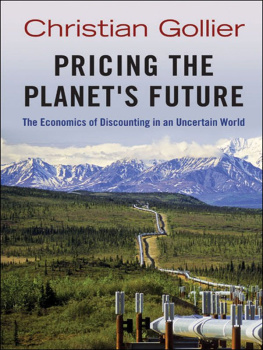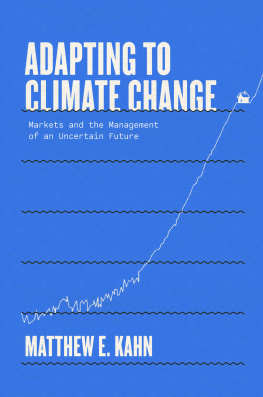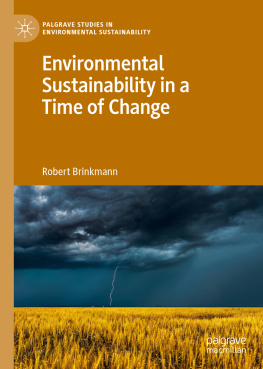PRICING THE PLANETS FUTURE

PRICING THE PLANETS FUTURE
The Economics of Discounting in an Uncertain World

CHRISTIAN GOLLIER
Princeton University Press
Princeton and Oxford
Copyright 2013 by Princeton University Press
Published by Princeton University Press, 41 William Street, Princeton, New Jersey 08540
In the United Kingdom: Princeton University Press, 6 Oxford Street, Woodstock, Oxfordshire OX20 1TW
press.princeton.edu
Jacket Photograph: The 800-mile Alyeska oil pipeline crossing the tundra near the Brooks Range in interior Alaska.
Ken Graham / AccentAlaska.com
All Rights Reserved
Library of Congress Cataloging-in-Publication Data
Gollier, Christian.
Pricing the planets future : the economics of discounting in an uncertain world / Christian Gollier.
p. cm.
Includes bibliographical references and index.
ISBN 978-0-691-14876-2 (hbk. : alk. paper) 1. Discount.
2. InvestmentsSocial aspects. I. Title.
HG1651.G65 2013
332.8'4dc23
2012017060
British Library Cataloging-in-Publication Data is available
This book has been composed in Times LT Std and Trade Gothic LT Std
Printed on acid-free paper.
Printed in the United States of America
1 3 5 7 9 10 8 6 4 2
Contents
Preface
Nearly fifty years ago, in 1968, William Baumol commented that few topics in our discipline rival the social rate of discount as a subject exhibiting simultaneously a very considerable degree of knowledge and a very substantial level of ignorance. This book aims to reduce the level of ignorance about the social discount rate, presenting recent advances in the field. Ultimately, the objective is to help build a consensus around the way society should value the future.
Many people have contributed to the development of this book. I am grateful to my co-authors on various papers related to this book: Louis Eeckhoudt, Miles Kimball, John Pratt, Jean-Charles Rochet, Ed Schlee, Harris Schlesinger, Nicolas Treich, Marty Weitzman, and Richard Zeck-hauser. I also thank Dominique Bureau, Christoph Heinzel, Jim Hammitt, and Stphane Gallon for their very detailed comments. My graduate students at the University of Toulouse also provided useful remarks and suggestions. I am particularly grateful to Steve Elderkin for his superb research assistance, with respect to both diligence and talent.
My debt to Jacques Drze goes back to the 1980s when, as a student at CORE in Louvain, I attended his enthusiastic and profound lectures on the economics of uncertainty. Although my intellectual interest in discount rates came later, I can trace it back to the IDEI lecture about the economics of climate change given by Kenneth Arrow in 1995. Since then, my curiosity about discounting and sustainable development has grown, reinforced by my interaction with many public and private institutions which have struggled with these complex questions. In the public sphere, let me mention the Centre dAnalyse Stratgique, the Conseil Economique du Dveloppement Durable, the French Ministry of Ecology, and more recently the U.S. Environmental Protection Agency. I have also benefitted from frequent enquiries and interactions with economists from Electricit de France (EDF), AREVA, and Rseau de Transport dElectricit (RTE), among others.
This book would not have been possible without the exceptional environment in my life. In addition to the members of my own family, I want to thank my colleagues at the Toulouse School of Economics (TSE) for the quality of the scientific atmosphere that I have enjoyed throughout the last twenty years. Working on a long-term project such as writing a book is a risky activity that requires self-belief to be maintained. This would not have been possible without the friendly encouragement of Jean Tirole, with whom I have shared the burden and honor of creating and managing TSE since 2007.
Finally, I acknowledge the continuing financial support of various institutions at crucial times in the writing of the book. The research has received funding from the European Research Council under the European Communitys Seventh Framework Programme (FP7/20072013) Grant Agreement no. 230589. This project was also supported by various partners of TSE and IDEI, in particular the Financire de la Cit, the partners of the Chair Sustainable Finance and Responsible Investment, and the French reinsurance company SCOR, which funded the Chair Risk Markets and Value Creation at IDEI.
is derived in part from On the Underestimation of the Precautionary Effect in Discounting, Geneva Risk and Insurance Review, 36 (2011): 95111.
are derived in part from Discounting with Fat-Tailed Economic Growth, Journal of Risk and Uncertainty, 37 (2008): 171186.
is derived in part from Maximizing the Expected Net Future Value as an Alternative Strategy to Gamma Discounting, Finance Research Letters, 1 (2004): 8589, and C. Gollier and M. L. Weitzman, How Should the Distant Future Be Discounted when Discount Rates Are Uncertain? Economic Letters, 107 (3) (2010): 350353.
is derived in part from The Consumption-Based Determinants of the Term Structure of Discount Rates, Mathematics and Financial Economics, 1 (2) (2007): 81102.
is derived in part from Wealth Inequality and Asset Pricing, Review of Economic Studies, 68 (2001): 181203.
is derived in part from Ecological Discounting, Journal of Economic Theory, 145 (2010): 812829.
is derived in part from Discounting an Uncertain Future, Journal of Public Economics, 85 (2002): 149166.
is derived in part from Discounting and Risk Adjusting Non-marginal Investment Projects, European Review of Agricultural Economics, 38 (3) (2011): 297324.
W. J. Baumol (1968), On the social rate of discount, American Economic Review (58), 788802.
PRICING THE PLANETS FUTURE

Introduction
Many books have described how civilizations rise, blossom, and then fall. Underlying this observed dynamic are a myriad of individual and collective investment decisions affecting the accumulation of capital, the level of education, the preservation of the environment, infrastructure quality, legal systems, and the protection of property rights. This vast literature, from Adam Smiths Wealth of Nations through Gregory Clarks Farewell to Alms to Jared Diamonds Collapse, is retrospective and positive, examining the link between past actions and the actual collective destiny. In contrast, this book takes a prospective and normative view, analyzing the problem of investment project selection. Which projects should be implemented to maximize intergenerational welfare? The solution to this problem relies heavily on our understanding and beliefs about the dynamics of civilizations.
FUTURE GENERATIONS IN THE PUBLIC DEBATE
Life is full of investment decisions, trading off current sacrifices for a better future. In this book, I examine the economic tools which are used to evaluate actions that entail costs and benefits that are scattered through time. These tools are useful to optimize the impacts of our investments both at the individual and collective levels.
Next page







